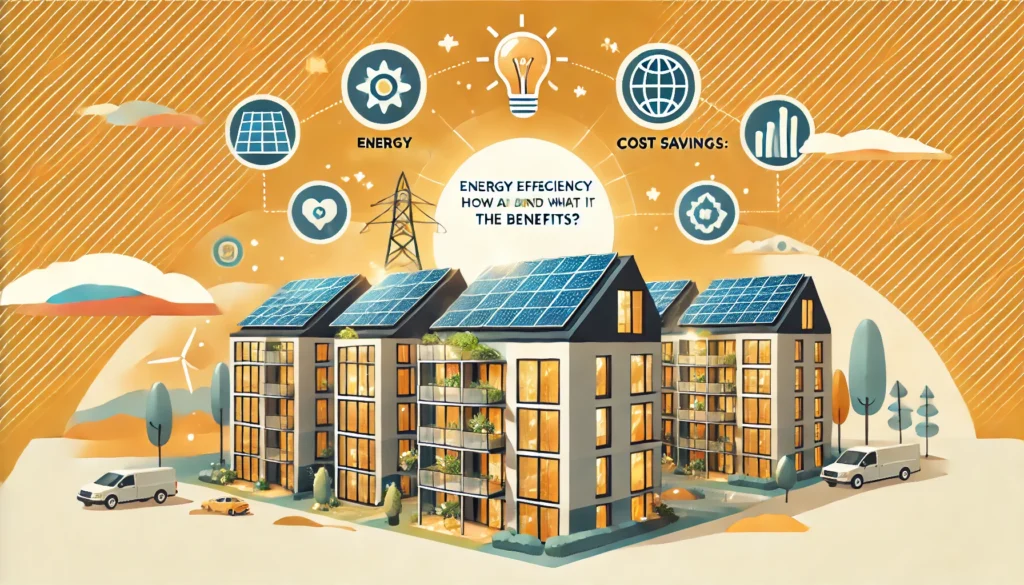Solar Energy in Condominiums: How Does It Work and What Are the Benefits?
Solar energy is becoming an increasingly popular choice for residential communities, including condominiums. While most people associate solar panels with single-family homes, condos can also benefit significantly from adopting solar energy. By working collectively, condominium associations and residents can share costs, reduce electricity bills, and embrace a more sustainable way of living.
Here’s how solar energy works in condominiums and the many benefits it brings.
- How Condominiums Can Adopt Solar Energy
Installing solar panels in a condominium setting requires planning, cooperation, and a tailored approach to meet the community’s needs. Here’s how the process typically works:
- Assessing Shared Spaces: Solar panels in condominiums are often installed on shared areas, such as rooftops, parking structures, or other communal spaces. These panels generate electricity that can power common areas, such as hallways, elevators, and lighting.
- Net Metering for Units: Depending on local regulations and the setup, solar energy can also be distributed to individual units. Through net metering, residents may receive credits on their electricity bills for the energy produced by the shared solar system.
- Community Agreements: Adopting solar energy in a condominium requires approval from the condo association or homeowners’ association (HOA). A clear agreement outlining cost-sharing, maintenance responsibilities, and energy distribution is essential.
- Financing Options: Condominiums can fund solar installations through loans, shared investments, or incentives. Many states offer tax credits and rebates that make it easier for communities to adopt solar.
By leveraging shared spaces and resources, condominiums can transition to solar energy efficiently and equitably.
- Cost Sharing and Financing Options
One of the biggest concerns for condominiums considering solar energy is how to split the costs fairly among residents. Fortunately, there are several financing models available:
- Shared Costs: The cost of installing solar panels is divided among all residents, reducing the financial burden on individual households. This approach works well when the panels primarily power shared areas.
- Power Purchase Agreements (PPAs): Some condominiums partner with solar companies through PPAs, where the provider installs and maintains the system, and the condo pays for the electricity it generates at a lower rate than utility prices.
- Government Incentives: Federal and state incentives, such as the Federal Investment Tax Credit (ITC), allow condominiums to deduct a percentage of installation costs from taxes. Local rebates and grants can further reduce expenses.
- Long-Term Savings: While the upfront investment may seem significant, the long-term savings on electricity bills often offset the costs within a few years, making solar energy a cost-effective choice for condos.
These cost-sharing strategies ensure that transitioning to solar energy is financially feasible for condominium communities.
- Benefits of Solar Energy for Condominiums
Adopting solar energy offers a wide range of benefits for condominium residents and associations alike:
Financial Savings
- Solar energy reduces reliance on the grid, lowering electricity bills for shared spaces and potentially for individual units.
- Through net metering, residents may earn credits for surplus energy generated by the system, further reducing costs.
- Over time, the savings from reduced utility bills can exceed the initial installation costs, creating a long-term financial benefit.
Environmental Impact
- Solar panels generate clean, renewable energy, significantly reducing the condominium’s carbon footprint.
- By switching to solar, condos contribute to global efforts to combat climate change and promote sustainability.
Increased Property Value
- Solar installations can enhance the value of individual units and the entire property by making it more energy-efficient and eco-friendly.
- Prospective buyers and renters are often attracted to properties with lower utility costs and a commitment to sustainability.
Energy Independence
- Solar panels reduce the condominium’s reliance on traditional energy sources, protecting the community from rising utility rates and potential power outages.
- Adding battery storage systems allows condos to store excess energy for use during peak demand times or emergencies.
- Overcoming Challenges in Adopting Solar Energy
While the benefits of solar energy are clear, condominiums may face unique challenges during the adoption process:
- Space Limitations: Rooftop space in condominiums may be limited, especially in high-rise buildings. However, innovative solutions like shared solar farms or vertical solar installations can help overcome these constraints.
- Regulatory Approval: Gaining approval from the HOA and navigating local regulations can be time-consuming. Working with an experienced solar provider can simplify this process.
- Maintenance Concerns: Solar panels require minimal maintenance, but establishing a clear plan for cleaning and inspections is essential to ensure optimal performance.
By addressing these challenges proactively, condominiums can implement solar energy systems smoothly and effectively.
- A Community Approach to Sustainability
Adopting solar energy is more than just a financial decision—it’s a commitment to sustainability and community well-being. Condominiums that go solar create a collective impact by reducing their environmental footprint and promoting clean energy. Here’s how this shift fosters a sense of community:
- Shared Responsibility: Installing and maintaining solar panels becomes a shared effort, encouraging collaboration among residents.
- Educational Opportunities: Going solar provides a chance to educate residents about renewable energy, inspiring individuals to adopt eco-friendly practices in their daily lives.
- Setting an Example: Solar-powered condominiums serve as role models for other communities, showcasing the practicality and benefits of renewable energy.
This collective approach to sustainability helps build stronger, greener communities for the future.
Conclusion
Solar energy offers condominiums an opportunity to save on electricity costs, reduce environmental impact, and boost property value. By utilizing shared spaces and resources, condos can transition to renewable energy in a way that benefits all residents. While there may be challenges to overcome, the long-term financial and environmental advantages make solar energy a smart investment for any condominium community.
If your condominium is ready to explore the benefits of solar energy, contact us today! Our team will guide you through the process, from initial assessments to installation, ensuring a seamless transition to a brighter, greener future.
Ready to make the switch?
Contact us today to learn how solar panels can help you save more in the long run!
Complete Residential Solar Panels and Systems. Serving Texas, Oklahoma, Kansas, Missouri, Utah, Florida & Ohio
Get a Free Quote Now
